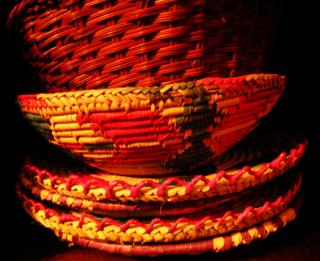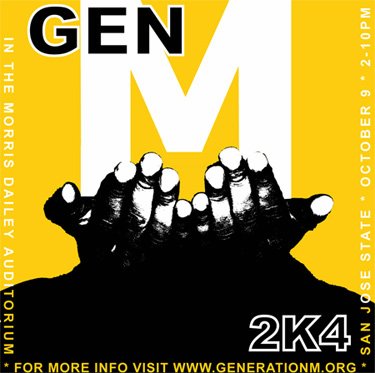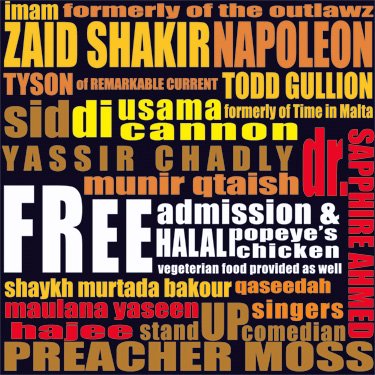Let me tell you about my friend S. My friend S is one of the most selfless people I know, the kind of person who, I’ve realized recently, is always putting everyone else before himself. Somayya is another one of those kind of people. They know it and I know it and everyone else knows it and they keep doing it, sometimes to their own detriment, but that’s what makes them so tight, dintcha know. It’s a vicious cycle sometimes, but we need more people like that in the world.
S is tight. Actually, he’s the self-proclaimed tightest person in the whole wide world. He used to send out emails to the listserve, signing off as, “S____ a.k.a. Tight One.” Most of the time, though, he’d email us one-liners stating simply, “I am so tight” or “I am hecka tight,” prompting me to fire back responses along the lines of, “Umm, no, the world does not revolve around you, buddy.”
I have to be careful about how I respond to S’s comments half the time though. Most of my conversations with friends and acquaintances revolve around sarcasm and wry remarks that may come off as disconcertingly harsh and are thus somewhat misconstrued by overly sensitive people like S. Recently, for example, in response to something he had said, I told S he was “hella rude and obnoxious.”
He reminded me that he is a fob, chiding me for using “big complicated words he can’t spell or say.” I didn’t realize until the next day that he was dismayed by my comment because he thought he had genuinely hurt my feelings or offended me. So he apologized profusely. Taken aback, I burst out laughing, until I realized he was serious, so I apologized in turn. And then I had to do a step-by-step explanation of the role of sarcasm in my daily conversations. What drama.
“Besides,” I explained later, “it’s not about me. You know I can take it. But you made that comment to someone you don’t know, and who doesn’t know you, and I think it comes off as a hella rude first impression.”
Then I told him how tight he was, to soften the criticism.
“I know,” he said, as if that were obvious. “People tell me all the time, ‘S___, you are so tight.’ I’m like, ‘I know I’m tight. Watch out, people, tight stuff walkin’ through.’ “
I rolled my eyes, as he continued muttering, “Man, I can’t believe I’m so tight.”
I’ve come to realize though that, like many of us, S uses his seeming arrogance, sarcasm, and blunt commentary as a front for masking deeper insecurities and somber life experiences. Once in a while, he’ll remain serious long enough to share unexpected, heartbreaking stories, like the one about the girl in high school who used to treat him like crap for wearing the same jeans every single day, because he could only afford one pair. Last summer, he told me I was wise, and I said, No, I’m just complacent, because life’s always been too good to me. How could I be wise, when I can’t even begin to fathom experiences such as his: “I’ve slept in the airport, on park benches and streets, collected cans at night… I have done all that, and I don’t take it for granted.”
“I remember where I come from,” he always tells me, “and I’m proud of it. Whatever I have now can be gone in a heartbeat, and I’ll give up everything I have, cuz I ain’t taking it to heaven.”
Two Fridays ago, I checked my phone and found the following text message from S, whose house I had left my car parked in front of that morning before hanging out with Somayya the rest of the day: I washed ur car n took most of da scratches 4rm da right door. I couldnt clean da rims.
I called him straightaway to convey my massive gratitude. “No problem,” he kept saying, with a note of genuine surprise in his voice, as if he couldn’t understand why I would be calling to thank him. “I was washing my car, so I thought I’d go ahead and wash yours, too.”
Last Monday, he called to ask, “Hey, are we still on for lunch tomorrow?”
“Yeah, of course.”
“Okay, cool.” He reminded me that he was heading out of town in two days, and that he would be back in Sacramento in a couple of weeks. “So hey, just drop your car off tomorrow when we go to lunch, and I’ll clean the inside of it, too.”
“Are you serious?!”
“Sure. For free. I love cleaning cars.”
“Will do, then. Awesome, dude. Thanks so much!”
“No problem. It’ll be ready by the time you get off work. Oh, hey, when’s the last time you got your oil changed?”
“I dunno. It’s been a while, I think.”
“How long a while?”
“A few months?”
“How many months?”
“I dunno, man,” I said absently, sitting down on the floor of my room and warming up my hands at the heater. “Maybe, like…last summer or something?”
“Ohhh my God… Do you know, you’re supposed to change your oil every three thousand miles? Okay, I’ll have to change your oil, too. The hell is wrong with you?”
He was supposed to tell me the lengthy, convoluted story about how he made it to the United States, a story he said would take him anywhere from two to five hours to relate. Instead, he spent our entire lunch berating me for not remembering the last time I got the oil changed in my car.
“I don’t remember, okay?” I said, throwing up my hands in impatience. “So get over it. I just take it to Jiffy Lube every few months, and they take care of all that drama.”
“Every few months? You said last summer. Your car doesn’t deserve you. By the time I’m done with it, it won’t even want to go home with you at the end of the day.”
“Well, I check my oil regularly, even if I don’t know how to change it. And the coolant, too. Doesn’t that count for something?”
He was not impressed.
We finished lunch, complete with much eye-rolling on my part, and then S dropped me off at work. He then called me twice that afternoon. The first time: “Hey, do you want Armor All on your car?”
I squinted. “Almond oil?”
“Armor All.”
“What’s that?”
“Say ‘yes,’ ” mouthed Somayya. “It makes your car all shiny.”
“Oh, yeah, definitely then.”
The second call: “When’s the last time you got your transmission fluid changed?”
“Umm…”
“Okay, I’ll change that, too.”
“Thanks, buddy.”
Preoccupied with work and pseudo-studying, I didn’t make it back to S’s house to pick up my car until almost 9pm that evening, but even in the darkness I could see how clean and shiny my car looked. S and I spent fifteen minutes walking around his driveway, checking out my car from every angle as he relayed everything he had done: washed/polished/waxed the outside, scrubbed the rims, vacuumed and cleaned every inch of the inside, changed my oil and transmission fluid… Thorough detail.
“Oh, and I replaced your air filter, too. Took out your old one and put a new one in.” He fished my old air filter out of the garbage can and held it under the garage door light. “See this?”
I peered at it.
“See how black this is?” he said, pointing out the obvious. “It’s supposed to be all white.”
“Dang.” I skipped around my car again, repeatedly rubbing my index finger against the surface, feeling like a gleeful little kid. “It feels so slick. You musta used hella wax and polish on this.” I laughed. “Dude, it looks so freakin’ clean, I can’t believe it!”
“It wasn’t that dirty,” he shrugged.
I looked at him in disbelief. “Man, are you kidding me? Did you somehow miss the black rims and the inch-thick layers of dust on the dashboard?”
“I’ve seen dirtier cars than that, okay. Make sure you get your oil changed every three thousand miles,” he reminded me. “With all your driving, you have to do this regularly. Wait, how many miles do you drive a week?”
“Umm. Six hundred a week between home and school. Oh, and I work three days a week in Sacramento, too.”
“Dayamm. So that makes how many?”
“Another ninety or so. So let’s make it an even seven hundred.”
“Seven hundred miles a week?!” he yelped. “For the love of God! What are you, insane?”
He handed me a plastic grocery bag. “What’s this?” I asked, peering inside.
“An extra bottle of oil, and one of transmission fluid, left over from what I put in your car.”
“Dude, just keep them for your own car,” I insisted, but he refused to take them. “Okay, just tell me how much all this stuff cost, so I can pay you back.”
“No,” he said obstinately, opening my car door. “Go home.”
“Fine then. I owe you a couple of lunches and ice cream, whenever you get back.”
“Okay, okay. Oh, and wear sunglasses in the morning,” he warned. “The car might blind you.”
I laughed, eyeing the car in the dark. “Buddy, I’m loving the shininess, whatever I can see of it. There’s no way it’s going to blind me.”
The next morning, however, I had to concede he was right, as the sunshine bounced off the interior of my car – especially the shiny dashboard and steering wheel – and attacked my eyes, which were already strained after a late-night study session. Yellow-orange-tinted sunglasses to the rescue!
I called S when I got to campus. “The car looks awesome, dude. Thanks so much!”
“If you thank me one more time,” he snapped, “I’m going to throw up.”
“Please restrain yourself. And get over it.”
In the afternoon, he left me a voicemessage: “Hey, what’s crackin’? I just listened to your message from last night, too. Stop thanking me. I just washed your car, it’s not like I saved your life or something. Have a beautiful day with your 10am to 9pm back-to-back-to-back-to-back-to-back classes. Oh, and make sure you don’t get stepped on, okay?”
I’ve been more in touch with S over the past week than I have over the past six months before that. This is mainly because I stalk him everyday by calling to tell him how shiny clean my car is, and how much I love it, and so he feels obligated to return all my rambling phone calls. Now that he’s got me all mushy about my car, S is working on two things:
1) Constantly reminding me about how short I am [I’m 5’1″, and, yes, I’m perfectly okay with this]
(Sample voicemessages: “Did I ever tell you that you’re so short? I noticed it today and was like, ‘Dang, Yasmine is hella short! I didn’t want to step on you.’ ” and
“To me, you will always be thirteen years old. Be careful and make sure you don’t get stepped on, okay?” and
“Why are you so short? And your brother is a giant. Why? Genetics can’t explain that.” and
“I’m taller than you. Taller means everything.”); and
2) Harassing me about my lack of study habits
(He called me a couple of evenings ago to check up on how my studying was going.
“Um, actually, I just finished dinner.”
“Dinner?” he said incredulously. “You got home at 7:30. That was three hours ago. It took you three hours to eat dinner?”
“Well, no, but there’s nothing wrong with prolonging a good thing.”
“Unless you’re taking 24 units,” he pointed out. “And your problem is, half the time, you’re driving. And the other half, you’re napping. What’s wrong with you? You’re always taking naps everywhere. You need to stop sleeping so damn much.”
And last night:
“Are you studying?”
“No! It’s Friday!”
“Every day is a Friday for you, isn’t it? How are you planning on passing those 24 units?”
“Shut up.”)
I’m easily amused and impressed by simple things, and so the ways to my heart are many. But because I am also the Commuter Child Extraordinaire, two things will earn you my massive, never-ending gratitude: Washing my car for me (which no one has ever willingly volunteered to do before S tackled the job), and filling up my gas tank to the max (which my dad always does on the rare occasions he borrows my car).
S called me late Thursday night to share a “pretty tight” verse from the Quran. Why do people always assume I’ll be awake at 12:30am?
Oh, wait, because I usually am.
To continue… I was actually asleep for once in my life, so he left a voicemessage with the verse, and the related footnote/commentary. I listened to it early yesterday morning, on my way to school, grateful for the timely reminder in these weeks of ungodly, uncharitable thoughts on my part:
And call not, besides God, on another god. There is no god but He. Everything (that exists) will perish except His own Face. To Him belongs the Command, and to Him will ye (all) be brought back. (Quran, 28:88)
Later in the day, while I was at work, he IMed me with, “Hey, I found another pretty tight verse.”
“What is it?”
“2:255. But I don’t know how to say it in Arabic.”
“Oh!” I said. “That’s called Ayat al-Kursi. It’s one of my favorites. I can recite the Arabic for you, if you want to hear it. Lemme call you when I get off work, okay?”
I finally got around to calling him that evening, while I was on the road, about ten minutes from home.
“For the love of God!” he exclaimed. “What took you so damn long? I’ve had the crappiest day ever, and I was looking forward to the Arabic version of that verse all day long.”
“Sorry. Alright, buddy, here goes…” So I recited Ayat al-Kursi and the two verses that follow it.
There was empty silence for a few moments after I finished. Then he said, “Wow.”
“Yeah, it’s good stuff, huh?”
“That just made you the tightest person in my book.”
“I already knew that, but thanks anyway.”
How can you not love being friends with a kid who sends text messages like the following, a la Martin Luther King, Jr.’s famous speech:
i had a dream and i woke up and wrote about it, that one day we will find a place to eat, i have a dream today that we will eat good food and chill, i have a dream today that my stomach will be full of good food, i have a dream today.
Today’s text message states:
u are tight cause u have a friend like me who is the #1 TIGHTEST. ME. i’m Tight. thus making u guys tight cause u guys are my friends.
Indeed.
 In characteristic Yasmine-is-a-Lazy-Bum fashion, I’m a few days late in posting this update. Here’s wishing you much ease and discipline in your fasting, whether it’s for Ramadan, Navratri, or the ten days from Rosh Hashana until Yom Kippur for the Jewish New Year. Abhi has a lovely post over at Sepia Mutiny entitled My first Ramadan, and Monologist’s post, My Navaratri, reflects many of my own goals and longings for this Ramadan.
In characteristic Yasmine-is-a-Lazy-Bum fashion, I’m a few days late in posting this update. Here’s wishing you much ease and discipline in your fasting, whether it’s for Ramadan, Navratri, or the ten days from Rosh Hashana until Yom Kippur for the Jewish New Year. Abhi has a lovely post over at Sepia Mutiny entitled My first Ramadan, and Monologist’s post, My Navaratri, reflects many of my own goals and longings for this Ramadan.

